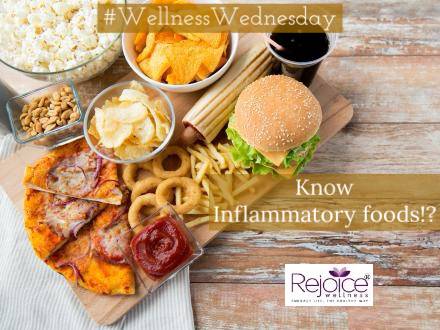
Know inflammatory foods!?

#WellnessWednesday
Know Inflammatory foods!?
Inflammation can be good or bad depending on the situation. It’s your body’s way of healing cell damage. While intermittent inflammation can be protective, chronic inflammation has been linked to many serious illnesses. In overdrive, it becomes dangerous and can lead to conditions such as diabetes, heart disease, arthritis, stroke and obesity.
Interestingly, the foods you eat can significantly affect inflammation in your body.
If you can identify and avoid these specific foods then we can keep inflammation at bay. And top of this list are these foods:
1. Added Sugar
Table sugar (sucrose) and high fructose corn syrup (HFCS) are the two main types of added sugar in the Western diet.
Eating a lot of fructose has been linked to obesity, insulin resistance, diabetes, fatty liver disease, cancer, and chronic kidney disease. Also, researchers have noted that fructose causes inflammation within the endothelial cells that line your blood vessels, which is a risk factor for heart disease. Research shows it may also counteract the
anti-inflammatory effects of omega-3 fatty acids.
When you digest something, the sugar enters your blood. Insulin then puts the sugar into your cells to give them energy. But when there’s too much sugar at one time, insulin tries to store the excess in your fat cells, causing them to get larger. Our body is not designed to process excessive amounts of added sugar throughout the day, we must be more aware when choose what we eat.
Natural sugars are already present in foods like fruit and plain dairy products. Natural sugars found in fruit and dairy are not so harmful. As they do not typically spike your blood sugar as quickly because they also contain fiber and lean protein to help slow digestion.
Foods high in added sugar include candy, chocolate, soft drinks, cakes, crackers, cookies, doughnuts, sweet pastries, bread, granola bars, salad dressings and certain cereals.
2. Trans Fats
Food manufacturers create tans fats through the process of hydrogenation to change texture consistency & shelf life of fats.
Trans fats raise your bad cholesterol level (LDL, VLDL) and lower good cholesterol (HDL) levels. Both actions can increase your risk for developing heart disease, stroke and Type 2 diabetes.
Foods high in trans fats include French fries and other fried fast food, some varieties of microwave popcorn, certain margarines and vegetable shortenings, packaged cakes and cookies, some pastries, and all processed foods that list partially hydrogenated vegetable oil on the label.
3. Refined Carbs
Refined carbohydrates are stripped of their nutrition and lack fiber. Fiber promotes fullness, improves blood sugar control, and feeds the beneficial bacteria in your gut.
High fiber, unprocessed carbs are healthy, but refined carbs raise blood
sugar levels and promote inflammation that may lead to disease.
Research shows that refined carbs may cause inflammation in your body. It’s similar to added sugars because nothing slows their breakdown. They hit your bloodstream quickly and spike your blood sugar. And elevated blood sugar creates an inflammatory response.
Also the refined carbs in the modern diet may encourage the growth of inflammatory gut bacteria that can increase your risk of obesity and inflammatory bowel disease.
Refined carbohydrates are found in candy, bread, crackers, pasta, pastries, some cereals, cookies, cakes, sugary soft drinks, sugary cereals and all processed foods that contain added sugar or flour.
4. Vegetable & seed oils [Omega-6 fatty acids]
Although some dietary omega-6 fats are necessary, the typical Western diet provides far more than people need. This excess triggers inflammatory reaction in body.
Vegetable and seed oils [Canola oil, safflower oil, sunflower oil, peanut oil, corn oil] are used as cooking oils and are a major ingredient in many processed foods. Also mayonnaise is high Omega-6 source.
5. Red & Processed meat
Processed meats have been salted, cured, fermented or smoked for flavor or preservation purposes. Research shows both processed and red meats are high in saturated fat, which causes inflammation.
Research have shown that higher intakes of these meats lead to cancer, heart disease and stroke, all of which go hand-in-hand with inflammation.
Processed meat is high in inflammatory compounds like AGEs, and its
strong association with colon cancer may partly be due to an inflammatory
response.
Common types of processed meat include sausage, bacon, ham, Peperoni, salami, smoked meat, and beef jerky.
6. Alcohol
Moderate alcohol consumption has been shown to provide some health benefits. However, higher amounts can lead to severe problems. Heavy alcohol consumption may increase inflammation and lead to a
“leaky gut” that drives inflammation throughout your body.
Inflammation can occur in response to many triggers, some of which are hard to prevent, including pollution, injury, or sickness.
However, you have much more control over factors like your diet. To stay as healthy as possible, keep inflammation down by minimizing your consumption of foods that trigger it and eating anti-inflammatory foods.
Focus on adding a lot of rich color to your plate in the form of different fruits and vegetables, plenty of healthy fats like avocados, nuts, and fatty fish, as well as leaner sources of proteins like beans, quinoa, eggs, and chicken.
